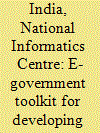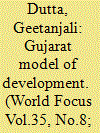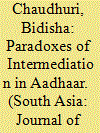| Srl | Item |
| 1 |
ID:
162042


|
|
|
| 2 |
ID:
065478


|
|
|
| 3 |
ID:
100241


|
|
|
|
|
| Publication |
New Delhi, UNESCO, 2005.
|
| Description |
xi, 209p.
|
| Standard Number |
8189218042
|
|
|
|
|
|
|
|
|
|
|
|
Copies: C:1/I:0,R:0,Q:0
Circulation
| Accession# | Call# | Current Location | Status | Policy | Location |
| 055472 | 352.381724/IND 055472 | Main | On Shelf | General | |
|
|
|
|
| 4 |
ID:
046618


|
|
|
|
|
| Publication |
Hershey, Idea Group Publishing, 2002.
|
| Description |
378p.
|
| Standard Number |
193070819X
|
|
|
|
|
|
|
|
|
|
|
|
Copies: C:1/I:0,R:0,Q:0
Circulation
| Accession# | Call# | Current Location | Status | Policy | Location |
| 045918 | 352.38028/GRO 045918 | Main | On Shelf | General | |
|
|
|
|
| 5 |
ID:
133444


|
|
|
|
|
| Publication |
2014.
|
| Summary/Abstract |
The Gujarat model of development, also known as Modinomics or Modi Model, is not about Gujarat's growth alone but development too. Its vibrant industries, perceptible improvement in social sectors, is a story of education, health, water, electricity and roads. It is a story of how the benefits have trickled down and how deprived segments have been streamlined. The Gujarat model, so to speak, has implications for other states too, since it is about governance, efficient public expenditure, decentralization and participatory planning.
|
|
|
|
|
|
|
|
|
|
|
|
|
|
|
|
| 6 |
ID:
167102


|
|
|
|
|
| Summary/Abstract |
E-governance projects in India are often purported to minimise the role of human intermediaries. They rely on machines to curtail corruption and bring more efficiency to service delivery. However, studies have found human intermediation and its affordances to be crucial, especially in developing countries where social endowment gaps pose considerable barriers to the effective use of information and communication technologies. Human intermediation in technological infrastructure is thus invisible yet inevitable. I unravel this paradox of intermediation by examining the everyday practices of two sets of intermediaries in Andhra Pradesh and Rajasthan associated with everyday workings of Aadhaar, India’s digital biometric identity infrastructure. Looking at biometric technologies as ‘situated practice’, I draw on the notion of ‘infrastructuring’ to argue that the discretionary practices of human intermediaries in fact stabilise the technological system, anchoring it to a human infrastructure. So, as disruptive technologies such as Aadhaar are implemented, their effective usage will invariably rely on the potential agency of human intermediaries and their collaborative work practices.
|
|
|
|
|
|
|
|
|
|
|
|
|
|
|
|
| 7 |
ID:
146012


|
|
|
|
|
| Summary/Abstract |
The impact of globalisation and industrialisation has been a subject for research around the globe due to the huge paradigm shift caused by them. Such phenomena are also a cause of concern as cities consume close to three-quarters of the world’s natural resources and generate three-quarters of its pollution and waste. There is a need for the cities to get smarter through the application of innovative solutions to address large-scale urbanisation challenges and find new ways for creating liveable, competitive and self-reliant cities.
|
|
|
|
|
|
|
|
|
|
|
|
|
|
|
|